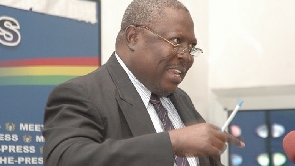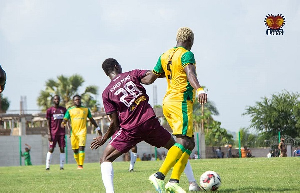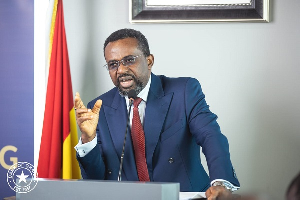Martin Amidu, then Attorney General and Minister of Justice, in a statement denied claims of ordering the arrest of Member of Parliament for Abuakwa South, Samuel Atta-Akyea, who was on police inquiry bail.
“I did not order any arrest, and I was not in the position to make any comments without the context of the arrest,” said Mr. Amidu.
Meanwhile, Martin Amidu who is now the Special Prosecutor of Ghana has justified his claim of issuing an Interpol Red Notice for the arrest and trial of brother of former president John Dramani Mahama, Adam Mahama, who has been indicted in the Airbus SE bribery case.
Some have claimed the move was politically engineered to dint the image of the former president.
Read the full story originally published on June 20, 2011, on Ghanaweb
Mr Martin Amidu, the Attorney General and Minister of Justice, on Tuesday denied a statement by the minority caucus in Parliament that he ordered the arrest of Mr Samuel Atta-Akyea, Member of Parliament (MP) for Abuakwa South.
Mr Amidu said: “I did not order any arrest, and I was not in the position to make any comments without the context of the arrest”.
A statement signed by the Attorney General and Minister of Justice said he first learnt of the alleged arrest of the suspect and the press conference of the minority through two telephone calls from Joy FM radio station when he was called on his cell-phone on July 14, 2011 whiles in Sydney to seek an interview on the arrest.
He said since his return from the Commonwealth Law Ministers Conference in Sydney, Australia on July 16, he had read a photocopy of the minority’s statement on the matter dated July 13, 2011.
Mr Amidu said he noticed that a basket of issues have been raised and very unsavoury comments and remarks made against not only his office, the President but also against the majority in Parliament generally.
The Attorney General and Minister of Justice said he has also read various versions of this discourse on the internet some of which named and implicated him (Amidu) personally in the arrest of the suspect, because the Republic lost the Yaa Na case in the High Court, which was concluded awaiting a ruling before my assumption of duty as Attorney General (AG).
Mr Amidu explained that the prosecution division of the AG’s Department on May 23, 2011 had come to the conclusion that the suspect, Mr Atta-Akyea, should be charged for fraudulent breach of trust and stealing, and for dishonest deceit of Joseph Adom, a plaintiff in the case.
He said on June 16, 2011 a written request was made to him seeking his consent to prosecute the accused.
Mr Amidu said he reviewed the docket and had no reasonable and arguable grounds to disagree with the request and as such granted the approval for action to be taken on the matter.
He said on June 20, 2011 the AG’s office received a petition from Akufo-Addo, Prempeh & Co on behalf of Mr Atta-Akyea accusing some officers at the AG department of being in cahoots with Mr Joseph Adom, putting pressure on him using the sword of criminal prosecution to settle a purely civil matter.
Mr Amidu stated that he had read the rebuttal to the accusations by the Deputy Attorney General and Minister of Justice, Mr Ebo Barton Odro, on July 15, 2011.
He said he had been briefed by the investigators of the case and had no reason to doubt their explanation that they eventually arrested the suspect by appointment when his lawyers accompanied him to the Criminal Investigations Department head office in Accra, as agreed by the investigators, who had gone to the court premises to invite him.
Mr Amidu said he had no reason to doubt the explanation of the police that they had invited the suspect, who was on police recognizance bail, to the police station on previous occasions but he had frustrated them by refusing to honour their invitations.
He said the police took the view that the suspect had by his conduct breached his bail bond by failing or refusing to report to the police on request without any explanation whatsoever.
“In these circumstances, I cannot fault the exercise of discretion on the part of the police to require substantial surety from the suspect before admitting him to bail upon his arrest by appointment” Mr Amidu added.
He said as AG he was more than experienced in the work and did not direct the arrest of suspects, who were already on police inquiry bail.
Mr Amidu said he did not interfere verbally in the exercise of police powers because these were matters which experience had shown were not advisable to do in secret.
General News of Thursday, 30 July 2020
Source: www.ghanaweb.com













